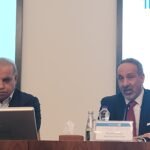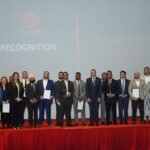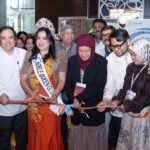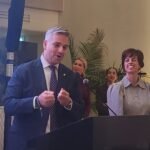As part of the activities of the State of Qatar Chair in Middle Eastern Studies at Peking University (PKU), established in 2014 during state visit of Emir of State of Qatar, Sheikh Tamim bin Hamad Al Thani to China, Qatar University (QU) recently hosted a lecture entitled “China Foreign Policy and the GCC”.
First in series of lecture was Co-chaired by Dr Khaled Almezaini, Gulf Studies Program Coordinator at college of Arts and Sciences (CAS), Qatar University, Dr Imad Mansour, Assistant Professor at CAS Department of International Affairs, Prof Wang Jisi, PKU Boya Chair Professor and Institute of International and President of Strategic Studies (IISS), Prof Wu Bingbing, PKU State of Qatar Chair in Middle Eastern Studies, IISS Senior Research Fellow, Deputy Director, Department of Arabic Language and Culture and Director, Institute of Arab-Islamic Studies.
Present on the occassion were Dr Darwish Al-Emadi, QU Chief Strategy and Development Officer, Dr Khalid Al-Khanji, QU VP for Student Affairs, Cesar Wazen, QU Scholarships and Partnerships Office Director and Dr Hani K Findakly, Chairman Clinton Group Inc. and the State of Qatar Chair in Middle Eastern Studies Oversight Committee member, as well as faculty and students from QU Gulf Studies Program and International Affairs Department.
Dr Darwish Al-Emadi welcomed the audience and the members of the Chair’s Steering Committee. He said: “The establishment of a Chair in Middle Eastern Studies aligns with Qatar University’s ongoing efforts to build collaboration with Peking University. The Chair will enhance links between Qatar and China and will provide a better understanding of Qatar and the region. It will also serve to establish collaboration between QU and PKU in the field of education and research, as well as students and faculty exchange. Other areas of collaboration cover the organization of joint events, conferences and lectures such this one.”
Dr Khaled Almezaini gave a brief introduction on the relations between China and the GCC. He noted that the Gulf states have been looking to diversify their economic and security partners. “The Gulf countries strengthened their cooperation with the United States and European countries. However, it is of great significance for the GCC to enhance their diplomatic relations with their Asian partners such as China in line with their foreign policy to diversify their economies and their security partners”, he said.
Prof Wang Jisi highlighted the relationship between China and the USA. He noted that the USA has not identified China as the major security threat. He said: “China is a challenge at the economic, political and military levels, but it is also an opportunity”. He also noted that two million Chinese tourists travel each year to the USA, and 30,000 Chinese students are now in the United States to pursue their studies. He also spoke on issues related to the current relationship between China and the USA since the presidential election of Donald Trump, the relations between the USA and Korea, and China’s international order.
Prof Wu Bingbing spoke about the “Belt and Road Initiative” noting that it is a development initiative that focuses on connectivity and cooperation among countries primarily in the Eurasian Continent, which consists of two main components, the land-based “Silk Road Economic Belt” (SREB) and oceangoing “21st Century Maritime Silk Road” (MSR). “The initiative underlines China’s push to take a bigger role in global affairs, and its need for priority capacity cooperation in areas such as infrastructure construction and manufacturing factor”.
He said "Belt and Road Initiative" is designed for the benefit of the world by driving world economic growth. It is a network of partnership and an initiative for China that includes all markets in Asia and Europe based on dialog and negotiation.”
Prof Wu Bingbing outlined the components of the “Belt and Road Initiative” which are the infrastructure construction, the industrialization and manufacturing, the energy sector, and the financial sector. He noted that infrastructure and industrialization are the key for China’s economic development and are closely related to energy and financing. “The "Belt and Road Initiative" is a road towards peace and friendship by enhancing mutual understanding and trust, and strengthening all-round exchanges”, he said.
He also noted that China has signed several agreements with Qatar and the UAE to establish collaboration for various investments in the region, especially in the field of infrastructure and construction. He also spoke about the relations between China and the Middle East and the relations between the GCC countries and Iran.
Dr Imad Mansour presented on “Chinese Foreign Policy from a Gulf Cooperation Council Perspective”. He explained why GCC diversification objectives and developmental goals would be served by collaboration with China, directly via bilateral relations, and indirectly through the “Belt and Road Initiative” and the Asian Infrastructure Development Bank. Common potential areas for collaboration include technology transfer, alternate sources of sustainable energy; securing maritime routes; training human resources; tourism in the GCC; connectivity; and consumption markets for GCC exports. He explained how these ongoing projects can position GCC capabilities in an emerging new global architecture. He also briefly reflected on how people-to-people on the historic Silk Roads greatly benefited the Gulf around a millennium ago, and how there is promise today in the various student exchange programs between QU and PKU.
Commenting on the State of Qatar Chair in Middle Eastern Studies, Dr Hani K Findakly said: “During his visit to China in 2014, His Highness the Emir Sheikh Tamim bin Hamad Al Thani announced the establishment of the State of Qatar Chair in Middle Eastern Studies at PKU. The Chair aims to provide a better understanding of the Arabic and Chinese cultures through the exchange of studies, faculty, and students. It will also serve to expand the Department of Arabic Language and Culture at PKU through the establishment of new social, business and finance programs.”
In the ensuing Q&A, the audience fielded questions on issues related to China’s role in the Middle East, China-Pakistan Economic Corridor (CPEC), and China foreign policy towards Syria, among others.









